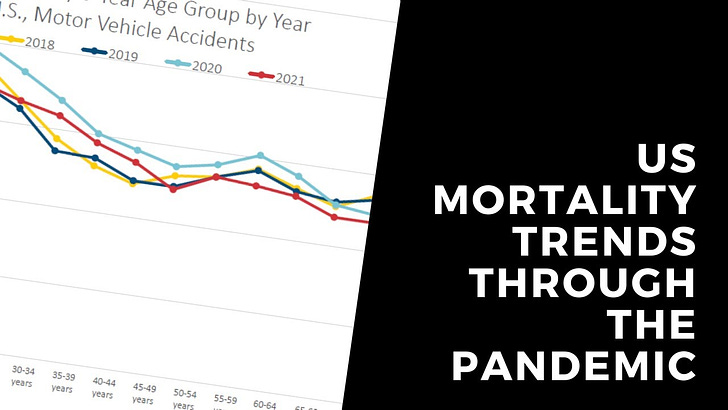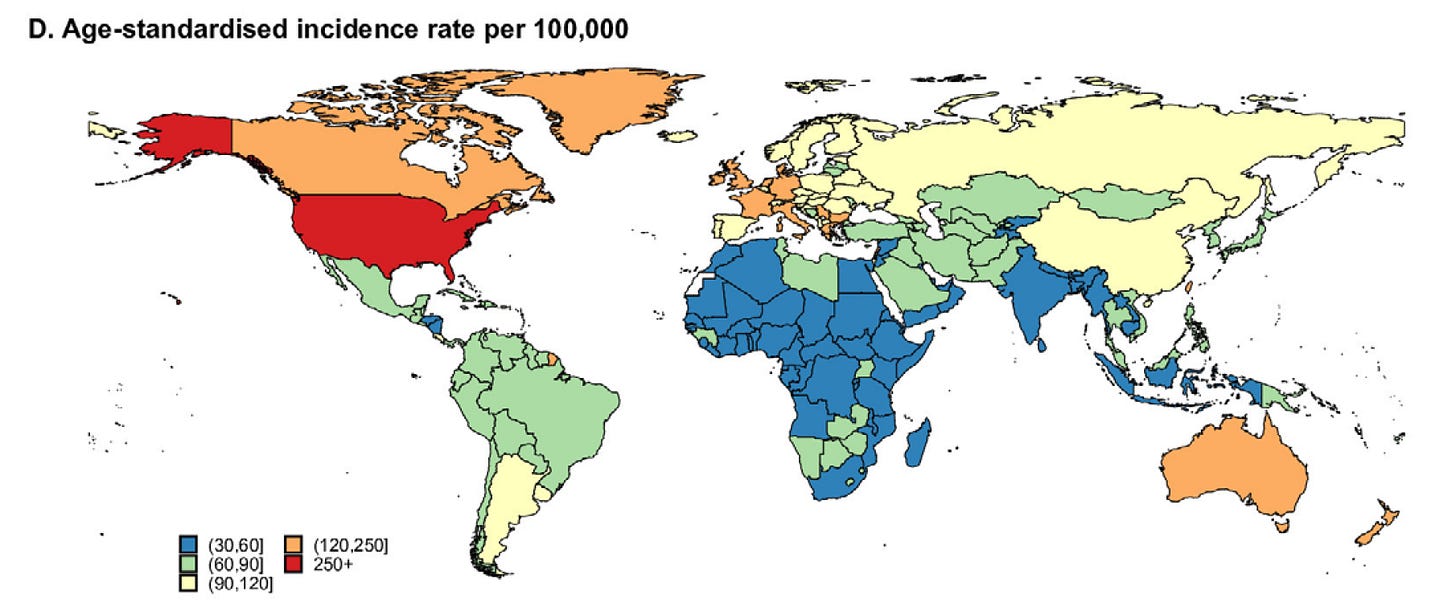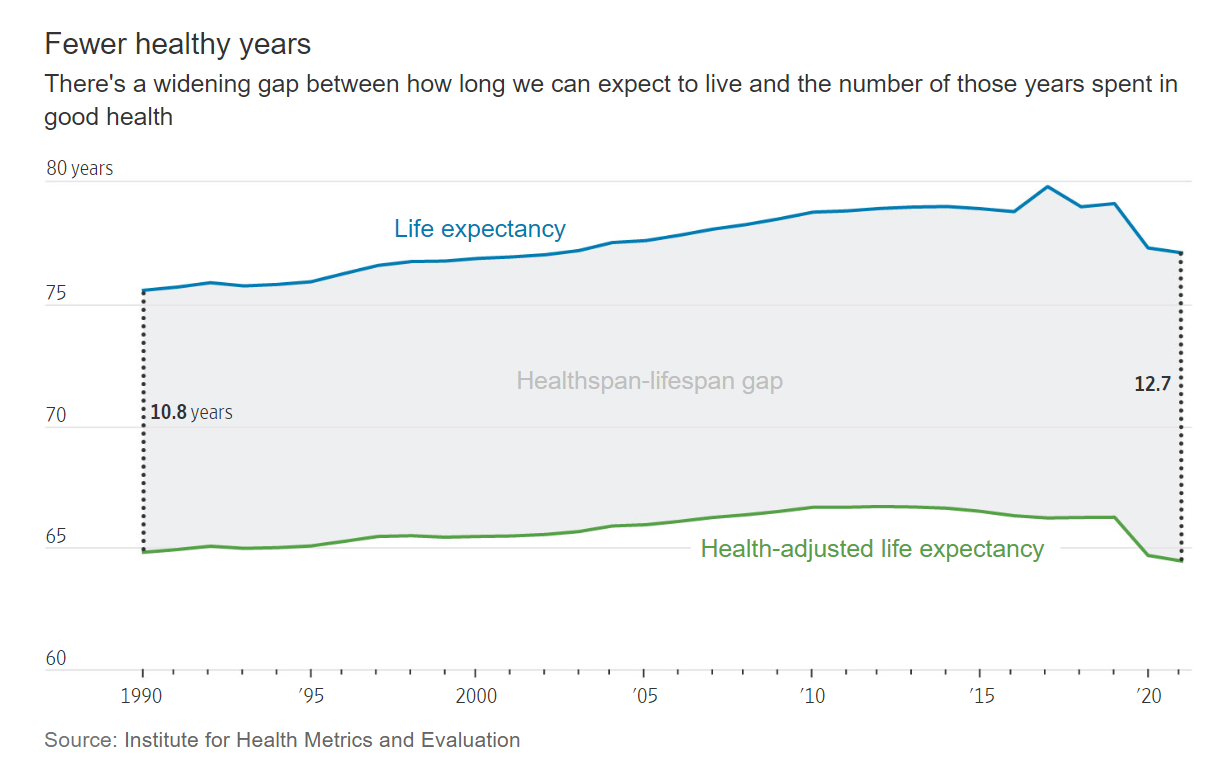Hello all — This is primarily to let you know that I’ve updated (and am continually updating) this post:
Mortality Posts and Resources: 2024 Update
This is a work in progress, and I will be pinning it at all my places (Twitter, substack, LinkedIn) to make it easy to find. I have written various resources over the years, and I will be returning to this post to add through 2024. This is intended not to organize all my mortality-related posts, but more of the core trend, definitional, and conceptual p…
Yes, I renamed the post (it’s no longer 2023, after all), and I’m bulking it up.
Substack has a particular view for its publication platform, currently, so I feel like I need such a post to index the mortality-related posts to make it easier for you to find the particular posts you need.
Yes, there is a search function, but that’s not the best way to find things, necessarily.
Higher cancer rates for younger people?
I do keep track of all sorts of morbidity and mortality trends, so let me link a few items without much comment.
Wall Street Journal: Cancer Is Striking More Young People, and Doctors Are Alarmed and Baffled
Cancer is hitting more young people in the U.S. and around the globe, baffling doctors. Diagnosis rates in the U.S. rose in 2019 to 107.8 cases per 100,000 people under 50, up 12.8% from 95.6 in 2000, federal data show. A study in BMJ Oncology last year reported a sharp global rise in cancers in people under 50, with the highest rates in North America, Australia and Western Europe.
Doctors are racing to figure out what is making them sick, and how to identify young people who are at high risk. They suspect that changes in the way we live—less physical activity, more ultra-processed foods, new toxins—have raised the risk for younger generations.
“The patients are getting younger,” said Dr. Andrea Cercek, who co-directs a program for early-onset gastrointestinal cancer patients at Memorial Sloan Kettering Cancer Center in New York, where Keen was treated. “It’s likely some environmental change, whether it’s something in our food, our medications or something we have not yet identified.”
Notice that the years involved are before the pandemic.
While everybody has been focused on sharp spikes upward in morbidity and mortality in 2020 and after, there have been indications of problems before the pandemic hit.
The research paper mentioned though, if one looks, one wonders — one of the figures:
I hate the projection being used - but this is a really confusing set-up as well.
But I’m going to isolate two sub-parts of the figure. This is the incidence rate (age-adjusted):
That looks awful for the U.S. and great for Africa, doesn’t it …. but it’s really based on whether you know somebody has cancer. If you don’t screen for it, you don’t know somebody has cancer. What do you think the screening is like in Africa?
But here’s something to look at:
If you look at the scales here… it looks like the age-adjusted mortality rate for cancer may be dependent on how good cancer treatment is in the particular country more than anything else.
It calls into question whether the increase in incidence in some countries is based on increased screening more than anything else.
More on Morbidity
WSJ: Your Healthspan Is as Important as Your Lifespan—and It’s Declining
Americans are living longer, but spending less time in good health.
The estimated average proportion of life spent in good health declined to 83.6% in 2021, down from 85.8% in 1990, according to an analysis of the latest data from the Institute for Health Metrics and Evaluation’s Global Burden of Disease study, a research effort based at the University of Washington.
The decrease of time spent in good health is partly because medical advances are catching and treating diseases that once would have killed us. But it is also because of the rising prevalence, often among younger people, of conditions such as obesity, diabetes and substance-use disorders.
Declining health takes a deep physical and emotional toll on patients and their caregivers. There are also broad ramifications on society, including rising health costs that eat into household budgets, as well as more people who want to work but can’t.
“The period of life spent not healthy is getting larger and larger and the implications of that are enormous,” says Dr. John Rowe, a professor of health policy and aging at Columbia University. “70 is the new 80.”
Okay, my commentary: a lot of this based on definitions, surveys, etc.
The reason I mention this is that I have had a chronic pain issue since 2010… but it doesn’t necessarily count for this “health-adjusted life expectancy”, as I can still walk around, I have grip strength, I can produce text (yay transcription technology!), and all sorts of things. I have never counted as disabled, officially, from this pain and the nerve damage I have.
Last Sunday, as part of the ministry of St. Joseph Catholic Church of Somers, NY, I visited one of the nursing homes in our parish’s area. I just deleted a bunch of commentary, because I know it’s tough for people to think about these things. So I will move on.
But I wonder about this “feeling good” thing. I just had one younger friend who is about to turn 40 mentioning how he’s just starting to feel pains he never felt before. And it’s hitting harder than he thought.
For me, my chronic pain hit when I was 36. And when I realized what it was, which I know is an unusual situation (guys, it’s not MS… but it’s not going to go away) — am I going to have to have this pain til I die? It’s been 14 years now, and I’m going with yes. I look back at the Catholic tradition, and…
Yes, pain is what’s in the forecast.
Look, this is me in terms of how I think about life:
But I’m in pain. All the time. But I’m enjoying life (while offering up the pain for the souls in Purgatory.
But I look at this morbidity graph from the WSJ and think: what does this even mean?
I have visited people in nursing homes and I see the variety of conditions. You can survey someone like me, where I will complain about my physical pain, but I can get out and about and do most of what I want to do. In the nursing home I visited on Sunday, most of the residents were in a condition such that they couldn’t answer a survey. I will not go into further details. They obviously are not going to be counted as in “good” health — but am I?
Developing health conditions takes more than a physical toll. Having a substantial health problem reduces life satisfaction more than losing a job or becoming widowed, divorced or separated, according to a 2022 study published in the Journal of Economic Behavior and Organization.
Kathie McClure, an 81-year-old who lives in a senior living community in Goleta, Calif., says being active and a part of her community is much more important to her than living for a long time. Still largely in good health, she hikes, gardens, volunteers as a docent at her local botanical garden and goes on walks with her son’s dog, a mutt called Patrick.
McClure says she has no desire to live beyond the ability to perform and enjoy the daily activities she loves.
“If I can’t play pickleball, I don’t want to be here,” says McClure.
….Uh.
Okay.
I can’t play pickleball, bowling, golf, or anything that is going to engage my neck or shoulders. That is the center of my problem.
But it’s not like I’m big on pickleball.
I used to do a lot of crocheting and knitting, but I really can’t do that anymore due to the pain in my hands. So that’s something real I’ve lost.
But I have other things to enjoy in life.
As my Aunt Pat had said, technology enables the disabled access to all sorts of things. While many people curse autocomplete and transcripts, it helps me write.
People say they can’t live without this, that, or the other… but when they actually come to it, they do find they find something else to take the place of the thing they lost.
It just makes me wonder what, specifically, they’re measuring, and how.
Because I don’t know what, exactly, I’m looking at in this graph. And I find that annoying.












Dear Mary Pat,
This P in a story about Congressional budget bills, made me think:
"Introduced by the chairs of the Bipartisan Fiscal Forum, Representatives Bill Huizenga (R‑MI) and Scott Peters (D‑CA), this proposal would establish a sixteen‐member fiscal commission, composed of twelve lawmakers and ****four independent experts.**** All members would be appointed by House and Senate leadership from both parties."
Four independent experts. If i had to pick only two words to describe you, "independent expert" would surely please us both. Would you, have you, considered serving on such a panel? Or is the whole thing surely so politically compromised and faux-serious that it would be pointless?
BRetty
https://www.cato.org/blog/34-trillion-debt-house-budget-committee-debates-fiscal-commission-act